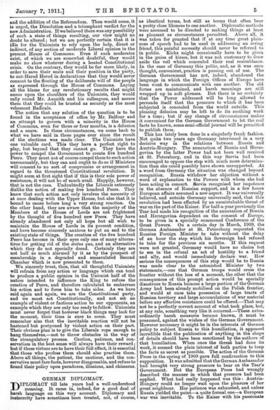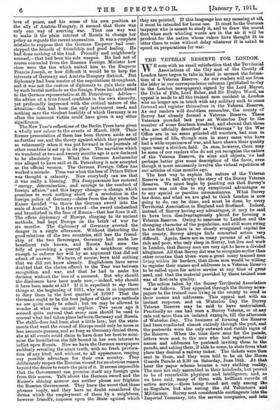GERMAN DIPLOMACY.
DIPLOMACY till late years had a well-understood meaning. It came in, indeed, for a good deal of harsh language on this very account. Diplomacy and insincerity have sometimes been treated, not, of course, as identical terms, but still as terms that often bear a pretty close likeness to one another. Diplomatic methods were assumed to be directed to making things at least as pleasant as circumstances permitted. Above all, it was taken for granted that if at any time great plain- ness of speech had to be used in addressing an erring friend, this painful necessity should never be referred to in public. Kicks might occasionally have to be given in the guise of kisses, but it was not customary to draw aside the veil which concealed their real resemblance. In the case of Germany this polite, and, as it was once thought, convenient, practice is passing out of use. The German Government has not, indeed, abandoned the language in which the Foreign Offices of Europe have been wont to communicate with one another. The old forms are maintained, and harsh meanings are still wrapped up in soft phrases. But there is no certainty that the Power addressed will be long allowed to persuade itself that the pressure to which it has been subjected is concealed from the world outside. This pleasing delusion may be left to do its soothing work for a time ; but if any change of circumstances makes it convenient for the German Government to let the real facts be known, some semi-official journal will be permitted to publish them.
This has lately been done in a singularly frank fashion. Not quite two years ago Germany intervened in a very decisive way in the relations between Russia and Austria-Hungary. The annexation of Bosnia and Herze- govina by the latter Power had not been well received at St. Petersburg, and in this way Servia had been encouraged to oppose the step with much more determina- tion than she could possibly have shown unsupported. At a word from Germany the situation was changed beyond recognition. Russia withdrew her objection without a word of explanation to the Powers with whom she had been acting in concert. Bervia recognised her impotence in the absence of Russian support, and in a few hours European affairs assumed a new aspect. It was universally believed, and outside Germany universally said, that this revolution had been effected by an unmistakable threat of war on the part of the Kaiser. For half-a-year previously the Tsar had made his recognition of the annexation of Bosnia and Herzegovina dependent on the consent of Europe, to be given in a specially summoned Conference of the Great Powers. On a certain day in March, 1909, the German Ambassador at St. Petersburg requested the Russian Foreign Minister to take without the delay of an hour the step which his Sovereign bad refused to take for the previous six months. If this request were not granted, Germany would have no choice but to see in the refusal an act of hostility to a friend and ally, and would immediately declare war. How serious the consequences of this step would be to Russia was made clear to the astonished Minister by two statements,—one that German troops would cross the frontier without the loss of a moment, the other that the consequences of this prompt action would be specially disastrous to Russia because a large portion of the German Army had been already mobilised on the Polish frontier, and would at once take possession of large tracts of Russian territory and large accumulations of war material before any effective resistance could be offered.—That may not be a perfectly correct account of what took place, but, at any rate, something very like it occurred.—These extra- ordinarily harsh measures became known, it must be presumed, against the wishes of the German Government. However necessary it might be in the interests of German policy to subject Russia to this humiliation, it appeared incredible that the publication of anything in the shape of details should have been sanctioned by the authors of that humiliation. When once the threat had done its work, it seemed the plain interest of both parties to keep the facts as secret as possible. The action of the German Press in the spring of 1909 gave full confirmation to this supposition. It was admitted that the German Ambassador had brought very strong pressure to bear on the Tsar's Government. But the European Press had wrongly described the manner in which that pressure had been applied. What had really happened was this : Austria- Hungary could no longer wait upon the pleasure of her great neighbour. Her patience was exhausted, and unless Russia yielded the point—a quite formal one—a European war was inevitable. To the Kaiser with his passionate love of peace, and his sense of his own position as the ally of Austria-Hungary, it seemed that there was only one way of averting war. That one way was to make it the plain interest of Russia to barge her policy as regards the recent annexation. It was a complete mistake to suppose that the German Emperor had over- stepped the bounds of friendship and good feeling. He had done nothing of the kind. Friendly and neighbourly counsel,—that had been his sole weapon. He had not of course concealed from the Russian Foreign Minister how close were the ties which united him to the Emperor Francis Joseph, or how difficult it would be to keep the interests of Germany and Austria-Hungary distinct. But diplomacy had been master of the negotiations throughout, and it was not the custom of diplomats to gain their ends by such brutal methods as the foreign Press had attributed to the German representative at St. Petersburg. Advice— the advice of a true friend confident in his own sincerity, yet profoundly impressed with the critical nature of the situation—this had been the only instrument used, and nothing save the virulent hostility of which Germany is so often the innocent victim could have given it any other significance.
The New Year's reflections of the Berlin Press have given a wholly new colour to the events of March, 1909. Their former presentation of them has been thrown aside as of no further use, and the theory against which they protested so vehemently when it was put forward in the journals of other countries is set up in its place. The narrative which we wondered at two-and-twenty months ago is now declared to be absolutely true. What the German Ambassador was alleged to have said at St. Petersburg is now accepted S the official version. The German Foreign Office has worked a miracle. Time was when the loss of Prince Billow was thought a calamity. Now everybody can see that it was really a blessing. His disappearance has restored "energy, determination, and courage to the conduct of foreign affairs," and this happy change—a change which promises to work nothing short of a revolution in the foreign policy of Germany—dates from the day when the Kaiser decided "to throw the German sword into the scale of Austria." It is the sword—the sword unsheathed and brandished in the face of Russia—that has done it all. The effete diplomacy of Europe, clinging to its ancient methods, had kept Europe on the brink of war for six months. The diplomacy of Germany averted the danger in a single afternoon. Without disturbing the good relations of the two countries, still less the friend- ship of the two Sovereigns, Germany had made her beneficent rule known, and Russia had seen the folly of provoking a quarrel with a neighbour strong enough to enforce her will by an argument that did not admit of answer. We have, of course, been told nothing that we did not know already. Englishmen have never doubted that the choice offered to the Tsar was between recognition and war, and that he had to make his decision without the loss of a moment. But why should the disclosure have been made now,—indeed, why should it have been made at all ? If it is expedient to say these things at the beginning of 1911, why was it so important to deny them in the first quarter of 1909? That the Germans ought to be the best judges of their own methods we are quite ready to admit ; but we may be allowed to wonder at what we cannot explain. Two years ago it seemed quite natural that every care should be used to conceal what had taken place between Germany and Russia. The stable-door had been shut a little late ; but the state- ments that went the round of Europe could only be more or less accurate guesses, and so long as Germany denied them, she at all events could claim to have done her best to mini- mise the humiliation she felt bound in her own interest to inflict upon Russia. Now we have the German newspapers suddenly revealing the exact truth, with no fresh provoca- tion of any kind, and without, to all appearance, reaping any possible advantage for their own country. They deliberately reopen the Russian wound for no obvious reason beyond the desire to renew the pain of it. It seems impossible that the Government can promise itself any foreign gain from this source. Talk about the German sword and the Kaiser's shining armour can neither please nor frighten the Russian Government. They know the worst that these phrases imply, and they have no doubt considered the duties which the employment of them by a neighbour, however friendly, imposes upon the State against which they are pointed. If this language has any meaning at a% it must be intended for home use. It must be the German taxpayer who is meant to study it, and to draw the moral that when such whirling words are in the air it will be prudent for the nation whose rulers have thought fit to utter them to raise without delay whatever it is asked to spend on preparations for war.



















































 Previous page
Previous page